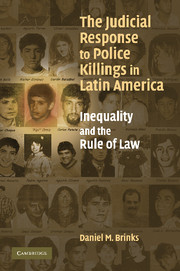Book contents
- Frontmatter
- Contents
- Preface
- 1 Effectiveness and Inequality in the Legal System
- 2 Charting Injustice in Argentina, Brazil, and Uruguay
- 3 Informational and Normative Shifts Across Jurisdictions
- 4 Buenos Aires – Political Interference and Informational Dependence
- 5 São Paulo – Normative Autonomy and Informational Failures
- 6 Uruguay – Strong Results from a Weak System
- 7 Córdoba – High Levels of Inequality in a Strong System
- 8 Salvador da Bahia – Social Cleansing Under Political and Judicial Indifference
- 9 Binding Leviathan
- Appendix: Methods, Case Selection, and Sampling
- References
- Index
4 - Buenos Aires – Political Interference and Informational Dependence
Published online by Cambridge University Press: 07 September 2009
- Frontmatter
- Contents
- Preface
- 1 Effectiveness and Inequality in the Legal System
- 2 Charting Injustice in Argentina, Brazil, and Uruguay
- 3 Informational and Normative Shifts Across Jurisdictions
- 4 Buenos Aires – Political Interference and Informational Dependence
- 5 São Paulo – Normative Autonomy and Informational Failures
- 6 Uruguay – Strong Results from a Weak System
- 7 Córdoba – High Levels of Inequality in a Strong System
- 8 Salvador da Bahia – Social Cleansing Under Political and Judicial Indifference
- 9 Binding Leviathan
- Appendix: Methods, Case Selection, and Sampling
- References
- Index
Summary
People are indignant with the police because they tried to pass off the three kids as thieves. This murdering policeman planted a knife on each of them to justify that he killed them because they tried to rob the service station. [They were actually killed for laughing at a police officer who had been assaulted by protesters.] If the kids had not been from this neighborhood, you can bet that the police would have claimed they were thieves, and the judge would have believed the story.
La Nación (January 6, 2002), quoting the cousin of one of the victims (my translation)The quote that opens this chapter aptly captures the essence of the judicial response to police homicides in Buenos Aires. The police obscure the truth and doctor the evidence, as nearly everyone knows or suspects. Despite this, courts and prosecutors are all too willing to accept the police account, unless there is some level of social mobilization surrounding the case. And so, in the end, it is up to claimants with the support of collective actors to press for an effective response. In the first two chapters I presented first the particular pattern of effectiveness and inequality that marks each system and then the nature of the prosecutorial failures that underlie this pattern. These patterns pose two main questions for Buenos Aires.
- Type
- Chapter
- Information
- The Judicial Response to Police Killings in Latin AmericaInequality and the Rule of Law, pp. 109 - 141Publisher: Cambridge University PressPrint publication year: 2007



